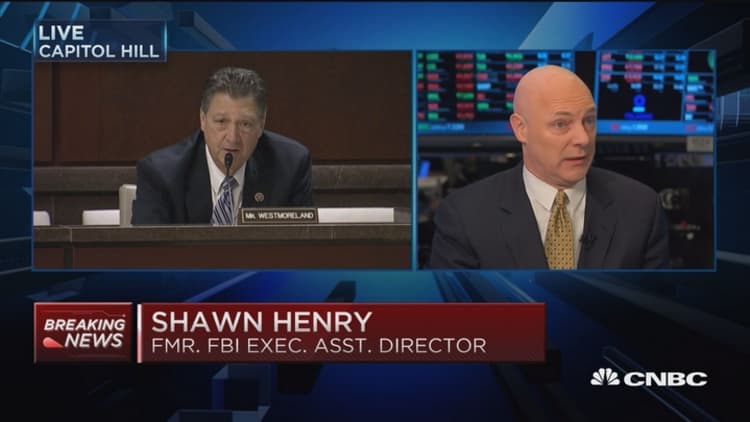


Reviews of Apple CEO Tim Cook's performance in his first television interview since a battle broke out between his company and the FBI were mixed.
The split mirrors the divide over whether the tech giant should comply with a court order to help the agency unlock an iPhone used by one of the San Bernardino terrorists.
Cook told ABC News on Wednesday that complying with the order would be "bad for America," and set a legal precedent that would offend many Americans.
Yale School of Management Dean Jeffrey Sonnenfeld said Cook "drifted all over the map" during the interview, veering from constitutional arguments to concerns about security, privacy, and creating a slippery slope, he said.
Sonnenfeld told CNBC's "Squawk Box" it was "terrible" for Cook to say that creating a method for unlocking an iPhone used by one of the San Bernardino killers was like creating a cancer.
During the interview, Cook said, "The only way to get information, at least currently the only way we know, would be to write a piece of software that we view as sort of the software equivalent of cancer."
Responding to that quote, Sonnenfeld said, "What he's done is he's resorted to something, forgive me, but close to demagoguery. The definition of demagoguery is what you just heard there, is when you appeal to people's emotions and passions and prejudice over rational judgment."
The FBI has asked Apple to create a new operating system that could be loaded onto the iPhone and override existing security measures built into the company's standard iOS software.
The iPhone in question was used by San Bernardino shooter Syed Rizwan Farook, who along with his wife went on a shooting rampage in December that killed 14 and wounded 22.
The case is "unlikely to be a trailblazer" for setting a legal precedent, FBI Director James Comey told a congressional panel Thursday.
While the case "will be instructive for other courts," broader policy questions about reasonable law enforcement access to encrypted data will likely need to be resolved by Congress and others, Comey said.
Crisis communications expert Eric Dezenhall said he thought Cook's argument on Wednesday was "very strong."
Cook's message was not that Apple will defy the court order, but that the FBI is seeking a back door into consumers' mobile devices, he said.
"Whether or not that is technologically true, I don't know, but it's a very, very powerful message and I think that they are going to be able to sell it at least to their consumers," he told "Squawk Box."
The Dezenhall Resources CEO said he would not ordinarily advise a client to pick a fight with the FBI, but Apple can get away with it because they are not viewed as a company, but as an "evangelical organization where people worship their products."



A Piper Jaffray survey of 1,000 consumers found that 24 percent viewed Apple more favorably in light of the dispute, while 23 percent had less favorable opinions. The rest were either indifferent or unaware of the story.
"If you use that as a leading indicator, even though this is a great topic to discuss, it ultimately probably is going to have little impact," Piper Jaffray senior research analyst Gene Munster told "Squawk Alley" on Thursday.
In the long term, a court decision in the FBI's favor could affect all device makers, he said. If Apple is forced to limit its security measures, it could lose a selling point that differentiates it from its competitors, he added.
Cook warned in a letter to customers that the tool the FBI wants Apple to create is the "equivalent of a master key, capable of opening hundreds of millions of locks."
Former FBI executive assistant director Shawn Henry said the agency only wants Apple to create the tool for one instance and noted that companies keep secret source code and proprietary data.
"I think to say that hundreds of millions of iPhones might be susceptible, that implies — understandably and rightfully — that the public doesn't want government to have this capability … indiscriminately," Henry, now chief security officer for CrowdStrike, told CNBC's "Squawk on the Street."
"I don't think that's the case here," he said.
Cook said there should have been more dialogue with the Obama administration before the Justice Department's decision to seek a federal court order.
"We found out about the filing from the press, and I don't think that's the way the railroad should be run, and I don't think that something so important to this country should be handled in this way," Cook said.
Apple has until Friday to formally respond to the court order.
— Reuters contributed to this story.
DISCLAIMER: Piper Jaffray was making a market in the securities of Apple at the time this research report was published. Piper Jaffray will buy and sell Apple securities on a principal basis.






